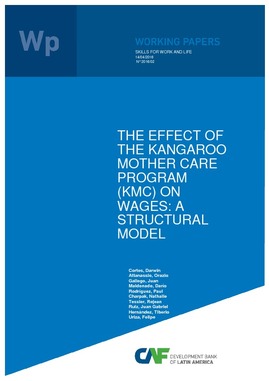The Effect of the Kangaroo Mother Care Program (KMC) on Wages: A structural Model
Abstract
In this paper we analyze the relationship between skills and some outcomes later in life for a population of premature children. Pretreatment skills and characteristics are good predictors of childhood and adulthood skills and outcomes. Income per capita and parents education at birth are positively correlated with home environment at 6 and 12 months of corrected age. Moreover, parents education and the proportion of workers at home are correlated with the number of preschool years attended by children. Interestingly, health indicators taken during the first year of life are critical factors for decision to enroll into a university, to obtain better results in math scores and earn larger wages.
Country / Region
Date
2016-04-14Cite this publication
Belongs to collection

Author
Cortés, DarwinAttanassio, Orazio
Gallego, Juan
Maldonado, Darío
Rodríguez, Paul
Charpak, Nathalie
Tessier, Rejean
Ruiz, Juan Gabriel
Hernández, Tiberio
Uriza, Felipe
Items Relacionados
Skills and selection into teaching: Evidence from Latin America
This paper documents a novel stylized fact: many teachers in Latin America have very low levels of cognitive skills. This skills deficit is the result ...
RED 2016. More Skills for Work and Life: The contributions of Families, Schools, Jobs, and the Social Environment
Skills are the mainstay of human capital. They are the capabilities that a person has to effectively solve different problems. Skills include not only ...
Education, Signaling and Mismatch
We assess the importance education as a signal of workers skills and the e¤ects of poor signaling quality on labor market outcomes. We do so by merging ...





